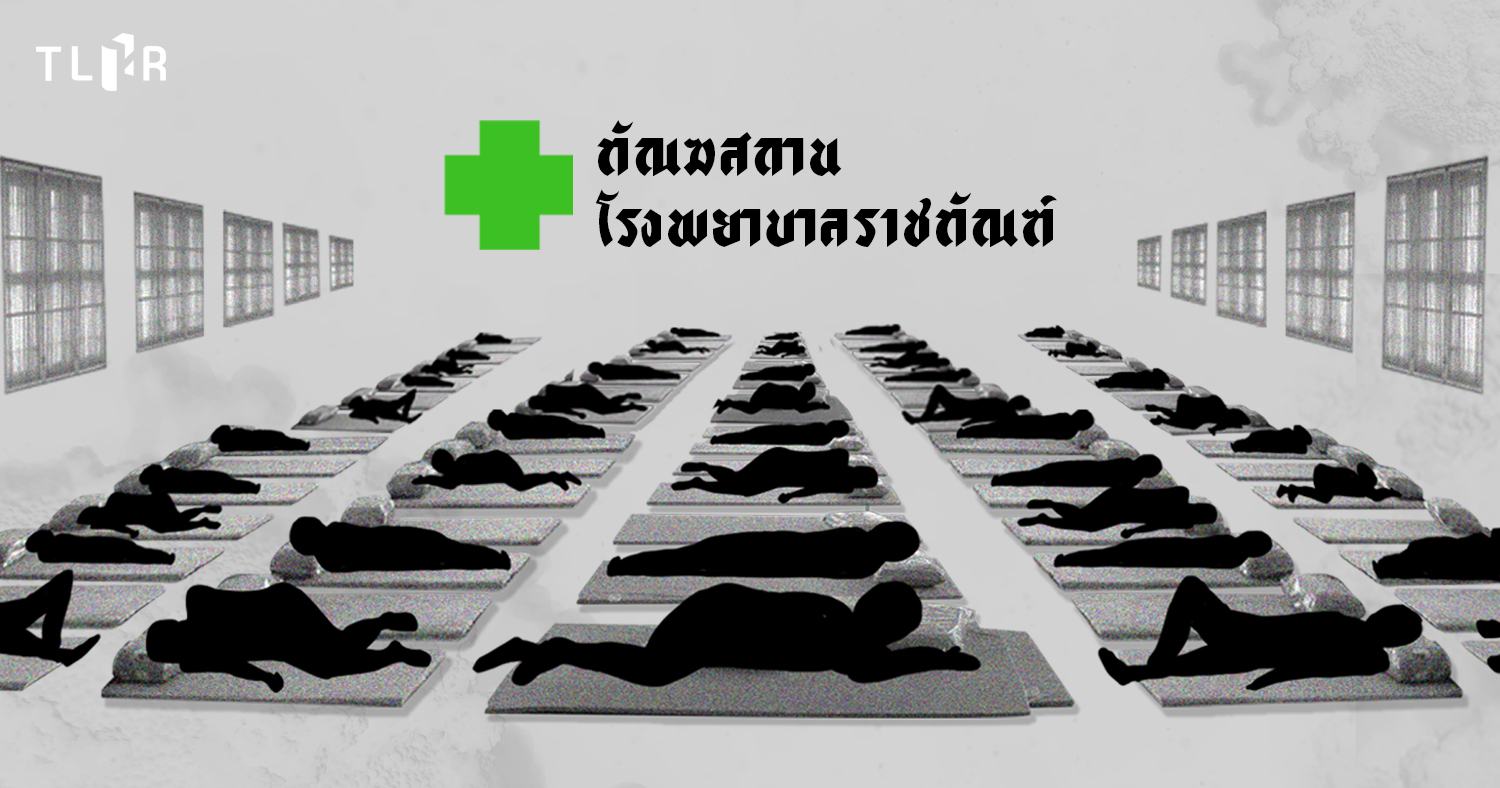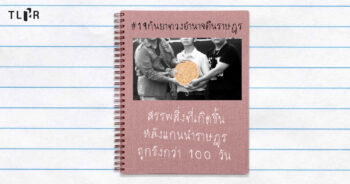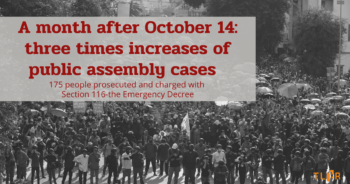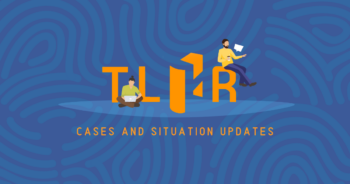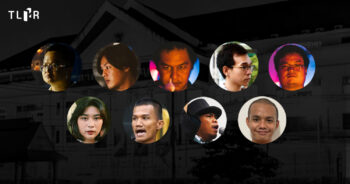26 August 2021
TLHR’s lawyers visited 6 activists today, namely Parit Chiwarak, Promsorn Veerathamjaree, Panupong Jadnok, Chatchai Kaedam, Sam Samat and Sirichai Natueng from the #Mob2August case at the Department of Corrections Hospital. In this case, a total of 9 activists surrendered themselves to the police and were immediately detained. Seven have tested positive for Covid-19 from inside the prison, one of which, Thanapat “Poon ‘, had been released earlier. Another activist, Natchanont Pairoj, is being held separately in a temporary prison in Rangsit.
We arrived at around 10 am. We had planned to visit the activists separately as Penguin was staying inside the hospital building, whereas Fah, Mike, Boy, Sam and New were treated at a field hospital or the so-called Building 10. However, by the time we got to visit them, it was already 1 pm because the devices for remote visits were used simultaneously for court hearings in other cases.
The main focus of today’s visit was to inquire about the wellbeing of the activists as well as the conditions in the Department of Corrections Hospital. Each of the activists took turns to update us about their experience.
Starting with Boy who had just been moved to the hospital yesterday and had his lungs examined. The doctor said that some spots were present on the lungs indicating that the virus had spread there. Boy mentioned that he could not sleep last night due to back pains, headaches, and a 38-degree fever. He also lost the ability to taste and smell and had high blood pressure.
He assumed that [the high blood pressure] was the result of the Green Chireta he had been taking since he was brought to the temporary prison in Rangsit. The prison officers instructed him to take 5 Green Chireta tablets per meal even prior to the infection, which probably affected his kidneys and blood pressure. “I’m telling you, the Green Chireta is not helping against the Covid-19.” That morning, he was also drawn blood and given antiviral drugs along with other medication. The fever had subsided already and the pain had gone away, yet he still struggled with swallowing food.
New (Hugo) told us that his symptoms remained unchanged. Unable to smell and taste, he had little appetite. He received vitamin B complex supplement today to support nerve functions. Furthermore, he asked us to relay the message to others that the reason he had gone on a hunger strike was because he was denied his right to lawyer during the first days at the hospital and was not allowed to change hospital. Now he has resumed eating.
Mike spoke deftly and experienced no symptoms. “Like last time, I had no symptoms. My lungs appear to be normal, unlike other infected people who seem to be struggling and have severe symptoms. They are not being taken care of.” Mike saw that the Department of Corrections did not have enough medical staff to tend to patients, and the facility was not suitable for treating Covid-19. “For example, Fah who had been moved from the temporary prison in Rangsit before me was detained with the rest, rather than being isolated.”
“[At the hospital] I’ve met some people I know from the Bangkok Remand Prison too. The first time I contracted Covid-19 in the Remand Prison was in March. Yet, I still see the prisoners from there here now. This shows that the measures at the Remand Prison have not improved at all. People are still infected.”
As for Sam, when the lawyer asked how he was, he answered jokingly, “gay”. He went on to say that he experienced chest pain, insomnia, and loss of appetite as usual, but the virus had not spread to his lungs yet. Thus, Sam only received some antihistamines and paracetamols. Sam suspected that the constant movement of prisoners at this prison might prevent the [Covid-19] patients from being fully recovered.
Besides, Sam stated that other prisoners did not receive the lung examination like they did. They were simply kept there for 14 days. Sam also noted that doctors (nurses) had come to check on them more frequently recently, after they had received a large number of complaints, including about the living conditions and medical treatment. For example, only 7 soap bars were provided for 60 people. The prison officials agreed to fix the issues.
For Fah, the loss of ability to taste and smell persisted. She was given Favipiravir and experienced chest pain from time to time. Fah said, “the hospital has no capacity to care for patients or manage the disease at all. In case of mild symptoms, the patients are just left alone.”
“The medicine prescription system works like this: the patients put a request for whatever symptoms they may have in the morning, and the nurses prepare them. It is no diagnosis. Patients with chronic diseases have to help themselves. There are thermometers, blood pressure monitors, and oximeters available for them to use on their own.”
Moreover, Fah and Sam told us further details about the current living conditions in the prison. There were currently 7 soap bars to be shared by 60 people, even though Covid-19 patients were supposed to use their own hygiene items. There were three meals a day, which followed no fixed schedule. Breakfast was served at around 8-9 am, usually rice soup or a dish to eat with rice. Lunch was served in rounds between 11 am–2 pm, usually rice soup. Dinner was from 3-4 pm consisting of rice dish in plastic bag and a separate spoon, but no dish soap.
Penguin, on the other hand, was staying in the hospital building. His symptoms improved, though he still coughed a lot. Doctor asked us to inform his family to buy asthma inhalers for him as the hospital only stocked strong medicines. The oxygen level in his blood became lower. The oxygen in his blood was at 95% in the beginning, then it rose to 97-98%. Now it has dropped to 95% again along with more intense coughing. Penguin had received 4 lung x-rays but was never shown the results.
Penguin mentioned that Wednesday, 25th August was an incredible day for him. His belongings that used to be lying around were put into places or neatly stored. He did not understand what was going on until he saw some journalists. The previously messy bed was now made and got clean sheets. Someone said even plant pots downstairs were new. The journalists came in the morning, and had left now (afternoon). Medical equipment that had been placed on patients’ beds returned to its original place.
Moreover, Penguin told us that the restroom in the room where he was staying had urine and stool on the floor. He suspected whether it was due to overcrowding issue. Though cleaned by volunteer prisoners, the restroom was never clean because there were too many patients. When he took a shower, he needed to wear sandals as there were molds on the floor. The old bed sheet that had turned yellow was changed as well. So were the clothes.
As for the treatment process, Penguin was staying in a shared room. He was not sure how many people there were, but it was the room for critical patients. Next step would be the ICU already. All of the fellow roommates were Covid-19 patients, some of whom also had other diseases, such as tuberculosis, fungal infection, or syphilis. The doctor did one round in the morning. The nurses used to come twice only in the morning and early evening, but they had started to visit more frequently lately.
“On my first day here (16th August), I was given two boxes of asthma medicines. Before I had taken any, the nurse took one back saying it was a mistake. I was very confused. Last Thursday, they forgot to give me medicines. These days I receive asthma medicines, Favipiravir, and cough medicines.”
The other day, the doctor asked him if it was ok to disclose the treatment result to the public. Penguin replied that he had not even seen his own x-ray results himself, how could he show them to the public first?
The meals came from the prison. Breakfast was served at around 9 am, lunch 11 am, and dinner 1-2 pm. The mealtime was neither normal nor regular. While food was slightly better in quality than at the prison, patients often complained that it was not enough. Yesterday they served Lod Chong (a kind of dessert) as well. He asked other people if this happened a lot, to which they replied only once in a while. After 4 pm, the ward was closed. Nurses did another round at 8 pm.
Penguin added that more people knew him this time around. Fellow prisoners approached him and talked to him. He talked history and politics, and shared books with them as well.
“Prisoners read books because there is nothing else to do. With people of similar ages, I talk about our dreams. I ask them what they did, why, whether there were social factors behind it, and how they saw their life if the politics or politicians were good. Some people had been in prison for ten years. They knew nothing beyond the prison walls. I gave them updates about the outside world.”
That was a part of the Penguin’s work during detention.
August 27th, 2021
Although this was not my first time inside the Klong Prem prison, it was my first visit of political activists at the Department of Corrections hospital. 8 out of 12 have contracted Covid-19 after the Court denied and revoked bail for some of them earlier this month.
On this visit, I was not prepared for the conditions of the Department of Corrections hospital, which accommodated more than 45 ill prisoners in one room. Patients were not divided according to the time they got sick. That was why I was surprised to see Jatupat “Pai” Boonpatraksa in Building 10 of this hospital too.
The familiar boy in a tank top put out his face to greet me, while explaining that he was sent here since 4 pm yesterday after the primary test and blood test result showed Covid-19 positive.
“I have not brought anything with me. Can you tell the lawyer to help bring me my stuff from the other prison (Central Special Treatment Center), please?”
Pai explained that he felt sick and had diarrhea, fever, and headache. After calling for doctor for 4 days and learning that the fellow roommates were infected with Covid-19, he found out that he, too, had got it. People who were previously tested positive were put together in a large room, which, according to Promsorn ‘Fah’ Veerathamjaree, had 4 soap bars for 45 patients.
I observed that the other patients, who were not political activists, were half-sitting, half-lying on something that was neither a mattress nor a bed. They were given a blanket each, but no medical mask. I did not see any hand sanitizer or disinfectant either, but that could be because of a narrow camera angle and weak wifi connection causing images to freeze and audio to break up often.
“Can you bring food to distribute to everyone here? Even one meal will do. I want them to eat good food for a change. “How else will they get better?” asked Sirichai ‘New’ Natueng, whose release was scheduled later that evening. Fah then added, “even though we got to eat many things we craved, we did not enjoy them. The others who did not get to eat were staring at us while eating. I want them to eat as well.”
I nodded understandingly. The images on the screen were showing no exaggeration. Next, I went on to read the messages that I had prepared to show the activists support. Everyone was saying in unison that they missed people outside. Being denied bail abruptly meant that they did not have time to manage personal businesses. Panupong ‘Mike’ Jadnok, for instance, insisted that we “ask [his] mother to take care of the plants well. They were expensive.”
I withdrew to give ways to other visitors to read the messages passing love from mother to child or from friend to friend. Particularly, the Save Bang Kloi Coalition had composed a poem for Chatchai ‘Boy’ Kaedam, who was paying close attention as the poem was being read to him despite Covid-19 infection in his lungs, which would cause difficulties sleeping according to doctor’s diagnosis. “But I have gotten better already”, said Boy. “The other day, just taking a deep breath already felt like dying”.
With limited time and more people to visit than anticipated, I had to wrap up our conversations and simply waved goodbye to Sam Samat and others.
Time keeps on ticking. Two days and one night at the Department of Corrections hospital and of not seeing each other must feel like forever for them. The colleague who accompanied me on the trip noted that ambulances constantly drove in and out of the hospital suggesting that the situation in prisons has not improved despite two years into the Covid-19 pandemic.
There was no exaggeration or false about what these activists had expressed about the Covid-19 management outside the prison. Instead of silencing critics, the government should prioritize solving the public health crisis urgently. I can only wish that these people recover in no time. That said, the most effective remedy to their illness is probably not Favipiravir, but a genuine democracy.
